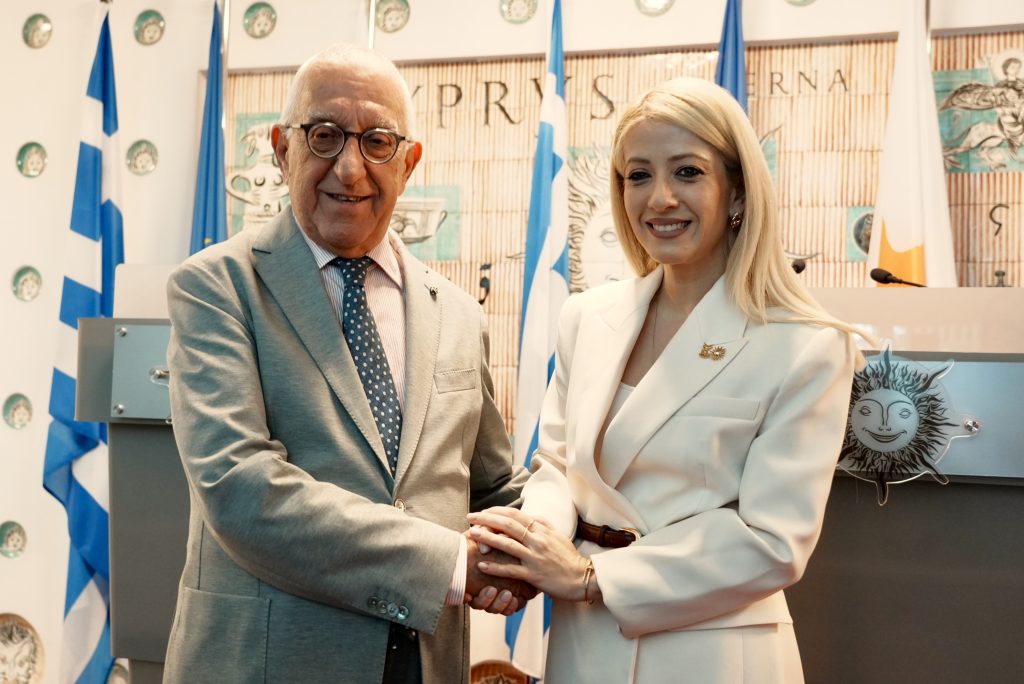For the first time in eight years there is some movement in the Cyprus problem following the initiative of the UN chief, and this is a positive development, President of the Hellenic Parliament Nikitas Kaklamanis said on Tuesday in Nicosia.
Addressing a special session of the House, Kaklamanis said Greece and Cyprus have made it clear that there can be no solution of the Cyprus problem without the “full withdrawal of illegal occupation troops” and “without Cyprus ridding itself of anachronistic guarantees and intervention rights from third parties in Cypriot affairs”.
Kaklamanis assured that amid tension at the Greek parliament, Cyprus was one of the few issues that united all parties.
Kaklamanis said he had served in a wide range of public posts, undertaking initiatives to promote the Cyprus problem.
This, he said, was for Greece a debt towards all those who fought for the independence of Cyprus, the heroes who defended the island’s freedom.
“The Cyprus problem is today high on the agenda of the UN, while the EU is seeking a more active role, in all the stages of the negotiating process for a solution, under UN auspices,” he said.
Referring to the informal enlarged meetings UN secretary-general Antonio Guterres convened in March and July were “a positive step”.
The enlarged meetings on the Cyprus problem involved Cyprus’ two sides, the UN and the guarantor powers – Greece, Turkey and the UK. A third meeting will take place in autumn, most likely November.
Kaklamanis expressed hope that these meetings would lead to the resumption of talks on the Cyprus problem, to the benefit of all Cypriots – Greek Cypriots and Turkish Cypriots.
“Any insistence on demands for a two-state solution contravenes the UN framework, is unacceptable and out of the question,” he said.
Despite the dedication of the Greek Cypriot side to reaching a solution, Kaklamanis said “we must not nurture any illusions – the solution of the Cyprus problem requires a shift in the stance of Turkey”.
House President Annita Demetriou said Kaklamanis’ first official visit to Cyprus in his capacity as president of the parliament was “highly symbolic” and an action of “fundamental political importance” because it affirmed the close, historical relations between the two countries and strengthened the will to maintain their joint front.
Demetriou praised the level of cooperation between the two parliaments, saying the publication of the Cyprus File was a milestone in this relationship.
The Cyprus File documents the events leading up to and during the coup d’état which took place in Cyprus on July 15, 1974, sponsored by the Greek military junta of the day.
She said the timing of his visit, coinciding with the October 1 celebrations for Cyprus’ Independence Day, was proof of the strong bond between the two countries.
Demetriou referred to the Cyprus issue – where “we cannot accept a two-state solution” – and the stance maintained by the Turkish side, and gave as an example the arrest of five Greek Cypriots in the north who were visiting their property there.
This, she said, was in retaliation for the prosecution in the south of usurpers of Greek Cypriot property in the north.
Kaklamanis agreed that the arrest of the five Greek Cypriots was not conducive to a favourable climate and demanded their “immediate release”.
Turkey’s actions, Demetriou said, did not facilitate its bid to join the EU and did not justify the country participating in the European defence and security architecture.
Referring to the explosive situation in the Middle East, Demetriou said Cyprus and Greece act as pillars of security and stability, and their role should be recognised by the international community and reflected as solidarity with them against the Turksih threat.
Demetriou said no European country could address the challenges alone and that collectivity and solidarity should act as a shield against populism, extremism, hatred, misinformation and undermining democracy.
She assured that during Cyprus’ EU presidency in the first half of 2026, the country intended to respond to the challenges and promote “a stronger, more resilient and even more democratic European Union”.

